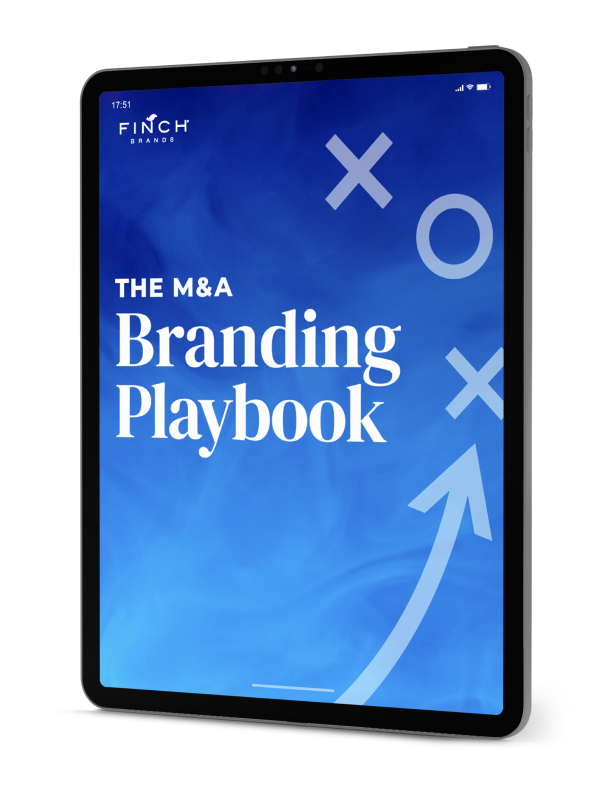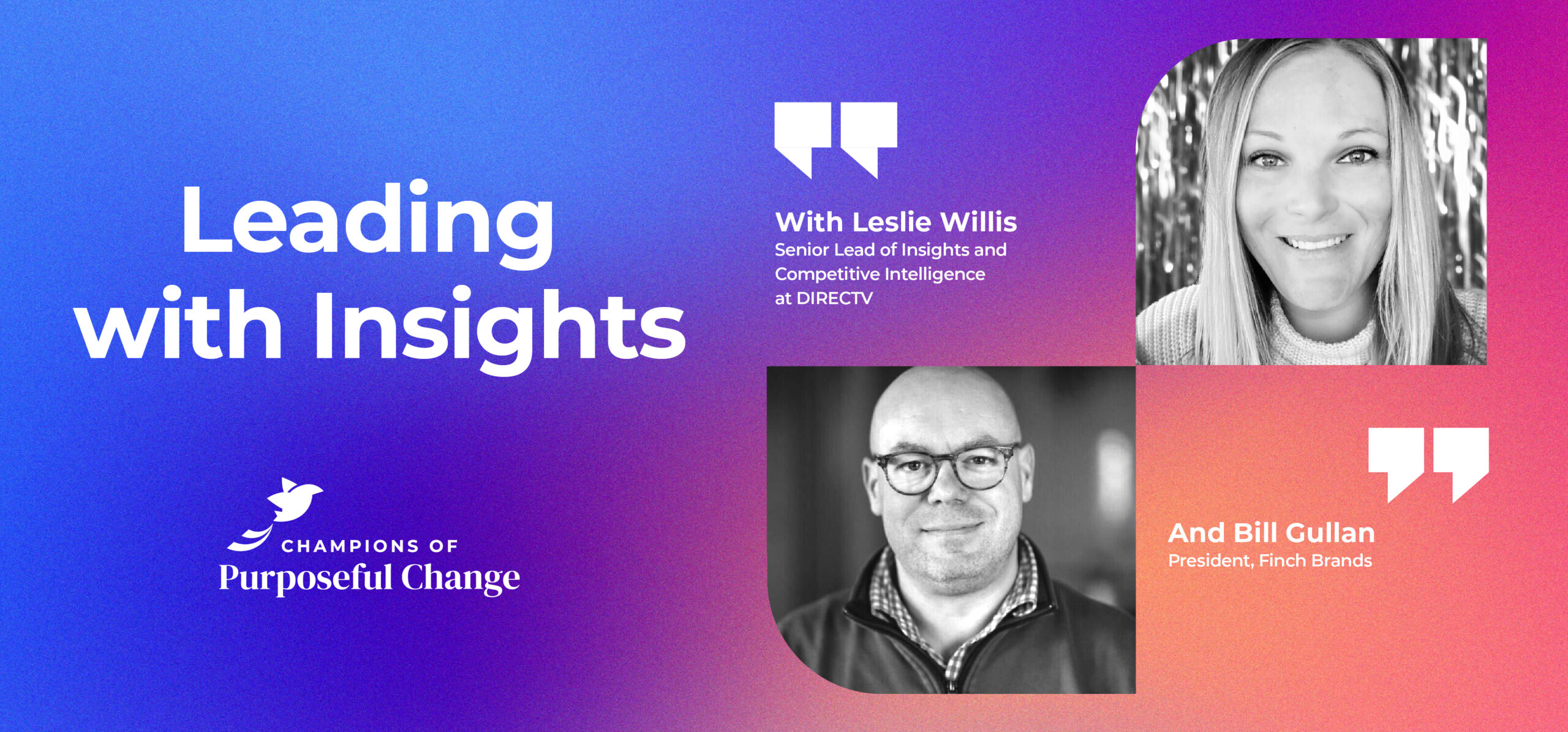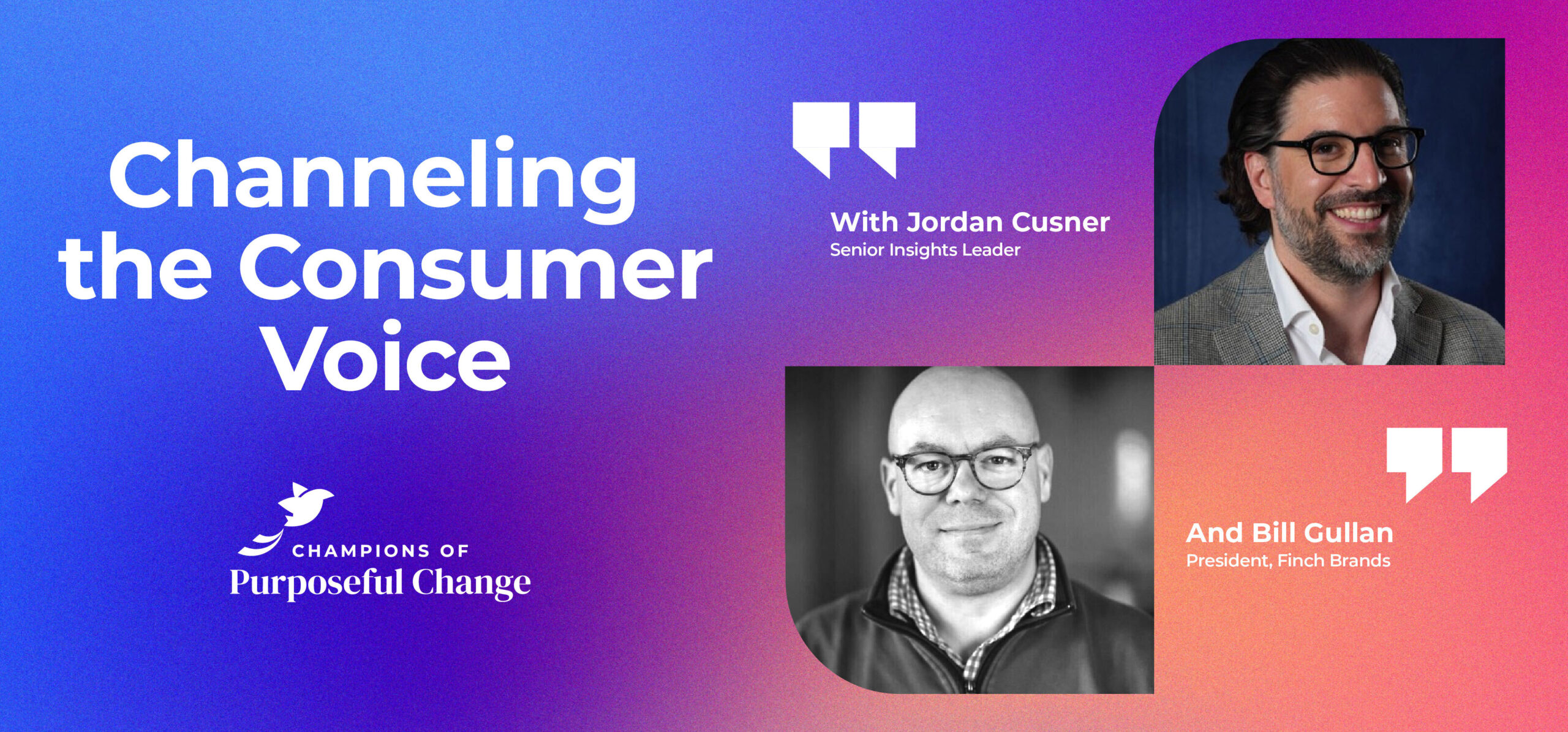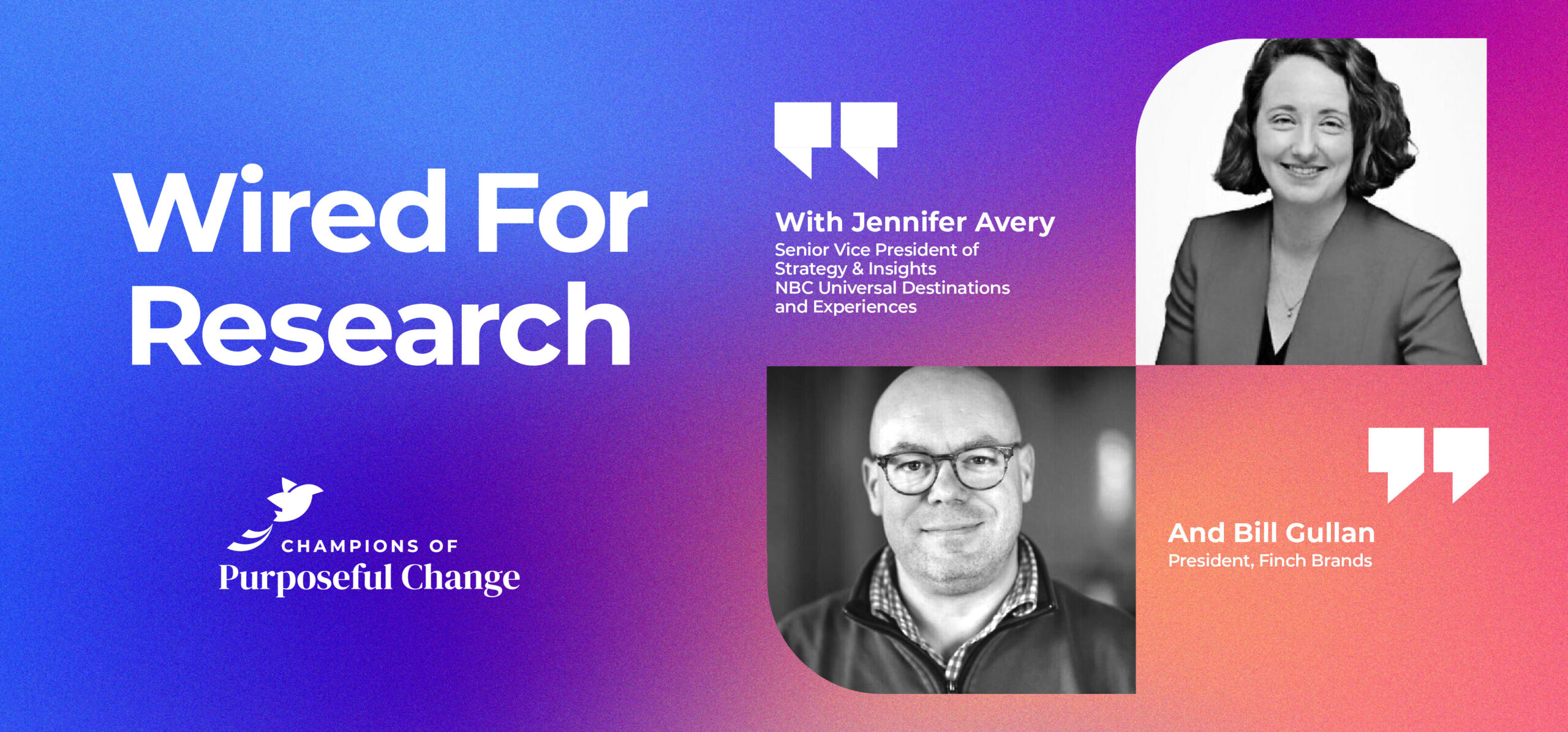Using Insights to Help News Organizations Break Through – with Nicole Rocchio of Google
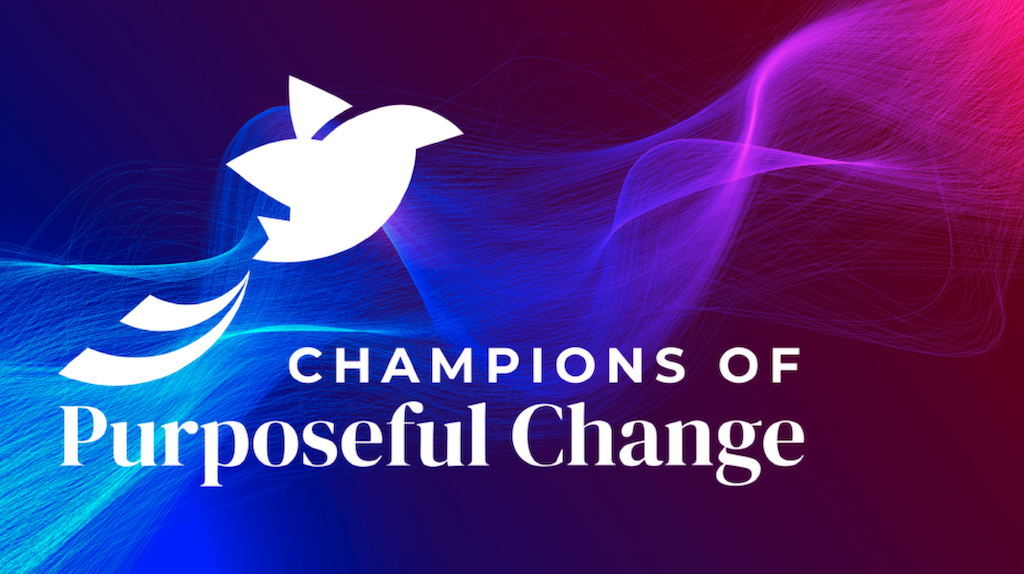
Join us as Nicole Rocchio, Global News Consumer Insights Lead at Google, takes us through her career and the unique initiative she leads – which helps news organizations use insights to connect with readers. With so much going on in the world, Nicole shares the thinking behind this initiative and how she works with leading publishers.
Bill Gullan: Greetings one and all. Welcome to Champions of Purposeful Change. Today we have Nicole Rocchio from Google who is the Global News Consumer Insights Lead, and Nicole will take us through a fascinating career coming up through the GE Healthcare Commercial Leadership Program, and then into various roles at Google, where now she leads a very progressive team helping publishers and other news organizations navigate Google offerings as well as connect meaningfully with readership. And Nicole will tell you all about it. Enjoy Nicole Rocchio.
We are so excited to have Nicole Rocchio from Google with us, though she’s a proud product of the Philadelphia area, as am I. And you’ve had a ton of time on the road. We’ve had a devil of a time scheduling this, but thank you for being with us.
Nicole Rocchio: Thank you so much, Bill. I’m so excited. I have had quite the schedule, and so I’m really excited to chat today. We’re going to have a great time.
Bill Gullan: Yeah. We are. And we’re so happy to have you. And before we get to Google, which is endlessly fascinating, it’s a little company someone may have heard of.
Nicole Rocchio: Sure.
Bill Gullan: Let’s talk about the backstory and kind of what has led you here. Growing up in the Philadelphia area as noted, Penn State undergrad, GE along the way. Give us the hop, skip, and a jump through Nicole’s story that leads up to Google.
Nicole Rocchio: Yes, I would love to. I should probably say go Eagles, right? Since we’re going to go-
Bill Gullan: Yes. Go birds.
Nicole Rocchio: Go Birds. So yes, I grew up outside of Philadelphia. And I started my journey, I guess we can start with our college journey, at Penn State.
Bill Gullan: Sure.
Nicole Rocchio: And so, while I was at Penn State, my major was in Human Development and Family Studies in the Health and Human Development College. So I did that as well as some psychology. And then, I did a lot of research in my undergrad, and my research was kind of within the family dynamics, infant development area. And so, then we fast-forward. Senior year, I have to find a job.
Bill Gullan: Yeah.
Nicole Rocchio: And I think that while I was considering all of these different areas, potentially going back to school, etc, I decided to head to the career fair, shout out to Penn State because they have a fantastic career fair.
Bill Gullan: Excellent.
Nicole Rocchio: And I stumbled upon the General Electric Healthcare booth. And so, obviously this kind of drew me in because of their healthcare. And there was this program there that I was really interested in. It was called the Commercial Leadership Program. And when I decided to interview with them, it was quite the interviewing process, a bit rigorous, and I ended up landing a job with the program and I started that. So that was kind of like my college into my first role.
I think what was really interesting with that first role, what it was exactly, was this two-year development program. So I moved every six months to a new city for two and a half years, which was absolutely wild, taught me a lot of things. And within this program, essentially what you would do is shadow different parts of the business, all with execs within General Electric. I would say that that really kick-started my journey through the corporate world. I was able to really learn so much in such a short period of time because I essentially was able to just watch execs and the way that they handled themselves in all different facets of the business, which was the coolest thing ever.
Bill Gullan: Mm-hmm. And so, I think you told me you did San Francisco, you did Milwaukee, you had a-
Nicole Rocchio: Oh, yes.
Bill Gullan: New cities, different functions, all kinds of stuff there.
Nicole Rocchio: Yes, exactly. So I essentially started in Boston. So there’s a class of us, there was 15 per year, and we all get different cities except for one of our phases. So the first phase I started in Boston. That was by far the coolest phase because I had the opportunity to not only meet the CEO of GE Healthcare, but also the CEO of GE and have a chance to chat with them, better understand their vision, very cool.
We moved on to Milwaukee, and that is where the headquarters of GE Healthcare in the United States exists. And that’s when I got to be together with my entire class. And so, all 15 of us were there learning more about the marketing areas of the business or the behind-the-scenes, inside sales, etc. And then, I moved on to Philadelphia, was very lucky to get selected for that area. Yeah very, very fun. And then, last but not least, it was San Francisco. And then, I was essentially in New York for kind of what I would be rolling off the program into my full-time role as before I made the pivot to join Google.
Bill Gullan: Mm-hmm. And so, at what point, was it in your undergrad? Was it through some of these GE exposures that insights became… You had, as you mentioned, a psychology interest. At what point did insights sort of crop up as a potential direction for you?
Nicole Rocchio: That’s a great question. I believe when I was in college, I mentioned slightly that I did some research while I was in college.
Bill Gullan: Yeah.
Nicole Rocchio: There is an underpinning of data across my entire story that I don’t think ever really went away. I found out in college that when you are learning concepts, or especially learning from human behavior, being able to look at the data and the insights from specific studies over years of time, et cetera, really, really do lead you to better understand exactly what you’re looking at. And so, I am a massive, massive data nerd.
Bill Gullan: Right, right.
Nicole Rocchio: And the insights that you can pull from that, that’s what I think actually will tell the story. That’s what you build your story around. And so, I always find that it is what you could consider more of a North Star or a guiding light to figuring out what your next step is, but also understanding the crux of the problem or the issue to then find a more viable solution. And this can be applied across any industry. But I would say that my research background in college kicked it off. And as I was moving through all of those different phases within the GE program, there were so many reasons to need to have very specific, tangible insights to certain things that we were learning, just so that we could honestly move forward or figure out what our next step would be.
Bill Gullan: Mm-hmm. Mm-hmm. And so, you’re about six years in, you went from GE to Google. Tell us about that transition and kind of what attracted you to Google initially, and then can’t wait to talk about what is a really cool role and a cool team that you currently occupy.
Nicole Rocchio: Yes, thank you. Yeah, you’re right. It’ll be six years in a couple months here at Google. While I was in San Francisco, I learned so much more about the tech world outside of the corporate business world. When you look at the healthcare system, I think that there are a lot of parts within the healthcare system that could use the help of technology in one way, shape, or form.
And while I was in San Francisco, I was exposed so much more to learning about new and up and coming tech. And there was a part of my brain that thought, “Okay, the corporate world is so important. I really have a good grasp, I would say, on the learning of the beginning of the business side. I do think that it’s so important this day and age to have a really good understanding of tech as well.”
Bill Gullan: Yeah.
Nicole Rocchio: And so, I was like, “Okay, I think it’s time to just make a pivot. Let’s head over to Google, check it out, see what’s going on. And then, maybe the two can be married in the next role or something that I would go into.” At least that was my original plan.
Bill Gullan: Yeah, it makes sense. And so, you are the Global Insights Product Lead for this News Initiative at Google.
Nicole Rocchio: Correct.
Bill Gullan: Whereas many of our previous guests here have really been focused on kind of internal constituencies and providing insights for decision support across things like innovation and marketing, etc. You work, it sounds like, with external constituencies primarily. Could you tell us a little bit about the team you’re on and the work that Google does with news organizations?
Nicole Rocchio: Yes, absolutely, would love to. I sit on a team called the Google News Initiative. Our team is specifically staffed to help support local journalism, globally speaking. So what we do, and there’s a myriad of different teams of course in our functions. Specifically my team, what we work on is we’ve developed a tool called News Consumer Insights. And within our tool, we have worked with over thousands of publishers at this point globally speaking to better understand audience engagement and reader revenue. So if a publisher has a website and they’re trying to better engage with their audience, figure out a way to have a very loyal audience, continue building that, and then also figuring out how, of course, to make money on top of that.
Bill Gullan: Sure.
Nicole Rocchio: So we’re talking ads, subscriptions, contributions, etc, we have a tool essentially that will look at all of your analytics on your site, that will look at the traffic on your site and your page speed, etc, all of these different factors. And the really cool part about our tool, which I’m going to be such a nerd about it because I think it’s absolutely fantastic for publishers, is we take… You have all this data, right? And so, you’re looking at your analytics data and you’re like, “Okay, but what does this mean?” And then, you’re able to pull from the data an insight.
So let’s say that there is 70% of users on mobile and 30% on desktop. And then, the insight though is that the speed on your mobile devices is not ideal. And that’s a great insight.
Bill Gullan: Right.
Nicole Rocchio: And you’re like, “Okay, that’s fantastic. I have something to work with.” But then, the next step, and that is what I find a lot of people actually do really struggle with, is, “How do I act on that insight to make it actionable?” And so, what our tool does is then gives you almost a step-by-step of, “This is exactly how you can improve your page speed on mobile.” And so, we have an entire recommendations tab that is personally curated to a publisher.
We’ve done so much research with thousands of publishers to figure out what works best for them, what they’re looking for, et cetera. And of course, I’m staffed around a bunch of individuals who are incredibly talented. And a lot of them have come from the news industry, whether that be they were a reporter or a journalist in a past life or something along those lines.
Bill Gullan: Mm-hmm. So potentially a dumb but direct question, why does Google care? Obviously, the ability of publishers to inform the public is good for the world, so there is a public-spirited side to this I would imagine. But why is this strategic imperative that Google has embraced the way that they have and put you and the team out there to sure that publishers can continue to optimize the experience for their readers?
Nicole Rocchio: Yeah. If we take a step back and we’re looking at everything that we’re doing in the world in general, I will say news is such a fundamental piece to connecting everyone everywhere. Getting truthful good news, getting news from every single area, these are things that we know are so incredibly important because we want everyone’s voices to be heard.
Bill Gullan: Right.
Nicole Rocchio: We think about news deserts and areas that have no journalists and no one reporting on them and how their voices aren’t able to be heard. And then, we recognize that there are smaller local news publishers whose voices could be heard as long as they have support in one way, shape, or form.
Bill Gullan: Sure.
Nicole Rocchio: And so, the reason that we were kind of put together was to give resources that were at no cost to the news organizations around, because making sure that you can get your news spread out to your community is so crucial to just kind of the democracy of our entire nation, if that makes any sense.
Bill Gullan: No, absolutely.
Nicole Rocchio: And it’s not necessarily the end, but it’s just news is kind of the guiding light to everything else. That’s connecting us with everyone and helping us make decisions and keeping us informed. And so, goodness, if we weren’t able to keep everyone informed in all of these different areas, I don’t know. I feel like that’s kind of a crack in the foundation of what we’re trying to build.
Bill Gullan: Yeah. No, well said. So you mentioned, just as an example that you gave us, this sort of desktop versus mobile. And I don’t expect you to expose things that are proprietary, but what are the types of things that you guys are working on day in and day out? Is it really through this tool and it’s sort of quant-driven? What are some of the sub-tools, I guess, that you and your colleagues are able to employ to help these folks optimize that experience?
Nicole Rocchio: That’s a great question. So to make it a bit more tangible, we connect, let’s say Google Search Console and Google Ad Manager or Google AdSense if you’re doing ads-related work. And then, we’re also connecting Google Analytics. And so, these are all of the different pieces of information that can kind of be plugged into this tool. And the way that we kind of work through it, and the reason that it’s so important at this period in time is because we’re launching a brand new version of this tool in the next week or so.
Bill Gullan: Oh, nice.
Nicole Rocchio: And so, you’ve caught me at quite an inflection point. But what this tool is doing is we’re having publishers within our beta group testing connect to the tool, and then making sure that the way that we’re customizing the recommendations to the publishers is properly working. And so, for example, another one of them that is not proprietary and I talk about a lot is newsletter signups, and the way that a newsletter signup widget should look on a publisher’s website in order to attract the right attention. And then, of course, what your newsletter should contain and the way that you engage with your readers, and taking a look at all of that data to collect the correct insights before making decisions moving forward.
Bill Gullan: So this is an end-to-end capability for, I’d imagine some of the publishers you work with and are fairly sophisticated on these topics, others maybe less so. Is it easy for a publisher to become part of this program? How does one go about it? You mentioned it’s a no-cost service. Why would anybody not want to? Is it easy to get involved?
Nicole Rocchio: Yeah. Right. I think that Google sometimes has such a large name, it can almost be a service in a way.
Bill Gullan: Sure.
Nicole Rocchio: Because there are so many teams and so many people working on a bunch of different things. If you were to just Google, that’s a silly statement, if you were to Google Google News Initiative, we would have a website page, a landing page, with a contact email where you could reach out to us. We also list all of our resources and tools on that website.
Bill Gullan: Sure.
Nicole Rocchio: And so, that’s the easiest way to get in contact with us. A lot of publishers are also a part of a larger association, and then we work with the associations one-to-one. And they have conferences, it’s conference season right now.
Bill Gullan: Sure.
Nicole Rocchio: And so, we also are easily able to communicate through the association that is discussing with hundreds of publishers different topics here and there.
Bill Gullan: Yeah. Excellent. Speaking of conferences, we connected with you in part because you have been a prolific attendee and contributor. Your thought leadership, your perspective has, I think we’re all glad, been spread across our industry. What are some of the things that you’re excited about as it relates to insights, things that are catching your eye? Obviously, everybody’s talking about AI in different contexts.
Nicole Rocchio: Yeah.
Bill Gullan: But as you look at the sort of near future of the industry that we share, some things that are attractive and high potential from your perspective, things that you have your eye on.
Nicole Rocchio: Yes. Well, you said the hot topic, which is everything everyone’s talking about at the moment, specifically at my company, of course.
Bill Gullan: Yes.
Nicole Rocchio: AI is hands down the number one thing we’re always discussing. Currently, right now, I’ve been to a few conferences now already, and I’ll be going to a few more. What I will say, the two I would say major themes for this year are AI and of course the elections that will be coming up.
Bill Gullan: Sure. Yeah.
Nicole Rocchio: And that’s more time sensitive, of course, the second one. But AI is absolutely at the forefront of everything that we’re doing. There’s so many things that I could say, but I will keep it short and then we can expand if we want. But in the context of AI, specifically within the news industry, I think what we are trying to figure out and focus on is how can AI aid the news industry in a way that does not cause misinformation or more harmful things that are kind of put out into the ether.
And so, we of course have teams of people, thousands of people working on different things here. But I think that we’re so excited to work with publishers and figure out the best way to service them in terms of the way that we’re using AI. And we have many beta groups, and the way that we’re working with them is just hoping that we can support them and lift them up and what is the best way to do that. And so, right now, that’s kind of the conversation that’s happening, and those are the conversations at hand so that we can collaborate together to build a future that makes sense for everyone.
Bill Gullan: Sure.
Nicole Rocchio: I will say it’s very top of mind.
Bill Gullan: Yeah. No, I can imagine. So you go to various conferences, you’re on the insights circuit as well as in the news realm, of course, in terms of your clients and the folks who are focused on the election, which is obviously a massive news event that is full of-
Nicole Rocchio: Hot topic.
Bill Gullan: Yeah, a hot topic that we’re all invested in one way or another, but is full, to your point, of opportunities and also things to be worried about, misinformation, et cetera. On the insight side of things, AI is a hot topic too.
Nicole Rocchio: Mm-hmm.
Bill Gullan: Any other things? You’ve become sort of a leader within your team and what you all do from an insights perspective. AI, as noted, has a role to play certainly in the future of insights. But other things that you’re maybe hearing about or thinking about, just maybe more insights related that are just kind of top of mind at this point?
Nicole Rocchio: We could take this in a variety of directions.
Bill Gullan: Yeah.
Nicole Rocchio: Insights, yeah, so with insights, I think the most important piece when you’re working with external players with your insights is figuring out what insights are actually resonating with those that you’re working with, and then making sure you’re moving forward on those.
Bill Gullan: Right, right.
Nicole Rocchio: And so, we could talk about specific topics, of course. Of course, we’re thinking about building loyalty or figuring out the right insights to gather from Google Analytics, let’s say. I think a lot of the times there’s so much to look at that, that it becomes incredibly overwhelming.
Bill Gullan: Sure.
Nicole Rocchio: And then, what I actually find, or what I see quite often is because it’s so incredibly overwhelming, there is a lot of individuals that will freeze, and then we’re really not doing anything with the insights that we’re gathering.
Bill Gullan: Right.
Nicole Rocchio: And so, if we’re not anything with the insights that we’re gathering, then where are we going? What are we doing?
Bill Gullan: Sure.
Nicole Rocchio: Yeah. And so, I think that without… It’s quite a broad response, right?
Bill Gullan: Yeah. Of course.
Nicole Rocchio: Without getting too detailed or nitty-gritty, I would say that in general, just knowing what to actually do with your data and your insights when you’re gathering them is so important. But everything in the terms of who I work with is about, “How can we build loyalty? How do we build a loyal community? What do we do with these insights? And what are they telling us about our community that maybe we weren’t paying attention to before?” Because a lot of people will make assumptions based off of their own behavior or actions, and then when you take a look at the data, it’s actually telling you something entirely different.
Bill Gullan: Right. Well, to your point, I would imagine again with folks on the publishing side who are varying levels of experience with this, that it is easy to become quickly sort of drowned in data, but starved for insight. I’d imagine that a fair amount of the time you spend is how do you cut through the sort of signal and the noise to really isolate data points that tell them something that could have an impact on what they do. Beyond just being very well aware of that in terms of what you deliver, are there any sort strategies that help you help them not get paralyzed and overwhelmed, but to focus on the things that the data is telling them to prioritize?
Nicole Rocchio: Yes. So we essentially will work with them in the sense of there are certain programs that you can also join through the Google News Initiative, where it’s a bit more hands-on in the sense of, “Can we discuss what you’re not performing well in? And then, let’s make a bit of a business plan here and do some detailing.” And there’s many different acronyms for types of planning, and I’m not going to confuse any of the listeners now with all of that. What I will say is that when you put pen to paper and you ask somebody, whoever this is when you’re working on insights, asking them what their top goals are and then asking them to write them out. So let’s say for example, Bill, I’ll give you 10 different things. I’ll be like, “All of these things, Bill. All 10 of them, you’re not doing well in any of them.”
Bill Gullan: Right. I’m probably not doing well in any of them myself, yes.
Nicole Rocchio: “You’re not doing well in any of them.” And so, you’re like, “Well, what do I do now?” And so, what we’ll do is we’ll help them understand the impact of the 10.
Bill Gullan: Right.
Nicole Rocchio: We’ll say, “Hey, these are the ones that are high impact. These are the ones that are more low-hanging fruit. Between all of those, let’s pick three that you’re going to focus on.” And then, we essentially write what we would say almost like a business plan for those three things.
Bill Gullan: Right. Uh-huh.
Nicole Rocchio: And then, when you have the ability to have someone just write, put pen to paper, it’s crazy the things that will happen if somebody has to write something down or has to type something out. And so, I would say that we of course could go down the route of what exactly does all of that entail? But I will say that just choosing a number of those goals that feels digestible to them is so important. And three is a very special number. I could also talk about that for a while.
Bill Gullan: Yes.
Nicole Rocchio: But three is what I recommend to start with and then building a plan around it.
Bill Gullan: Right. Cool. Cool. And you’ve mentioned some of the areas that I imagine are very lively and important topics among publishers: newsletter sign up, loyalty in general, things like site navigation, mobile versus desktop. Everybody probably has a slightly different strategy and approach to these things. And those are fundamental, it would seem, along with a couple of other things, to connecting readers with the content that they’ll find value in.
Nicole Rocchio: Yes. You would have no idea when a reader is on a site, the things that you should do almost to make sure that you’re engaging them properly and not creating too much frustration or a bad user experience. So we talk so much about UX, or user experience for those that are listening, on a website. And so, it’s not only around newsletters, but we’re talking about, “Where do you put that newsletter sign up widget? Or if you’re going to have something pop up, when do you have something pop up? Or do you have anything pop up at all? Do we have push notifications that we will employ? How do we do recirculation of your content?”
On your subscription landing page, for example, if a publisher was to ask for a contribution or subscription from a reader, publishers have on average about eight seconds to convince a reader to subscribe or donate when they land on that landing page. And so, “How do we design that landing page to make it incredibly simple, easy to digest, but also enticing enough for somebody to move through the funnel and then purchase a subscription or contribute to that reader or to that publisher?”
Bill Gullan: Right.
Nicole Rocchio: So yeah, that on top of how fast your page is loading and the data to make sure you understand why your page isn’t loading properly, or the insights from that to better understand when users are dropping off or why they’re dropping off and maybe what content they’re dropping off on and should we maybe not produce as much of that content.
Bill Gullan: Right, right.
Nicole Rocchio: And some other stuff.
Bill Gullan: Right. Wow, it sounds like, I’m sure it’s a rich trove of insights that these folks may not have ever sort of had access to, or at least not in as helpful a way. So yeah, you are back in New York. Google, you guys have a big New York presence. But talk a little bit if you wouldn’t mind, again, nothing that’s too proprietary, but about kind of the culture at Google. Obviously, it’s to your point, a very tech-forward organization that is deeply embedded into the fabric of our lives globally. What’s it like to be, you call Googlers, is that what the term is?
Nicole Rocchio: Yes.
Bill Gullan: What’s it like? Tell us a little bit about the life inside.
Nicole Rocchio: Give you a peek inside? Yes.
Bill Gullan: Yeah.
Nicole Rocchio: So I actually had originally started out working for Google in Mountain View.
Bill Gullan: Yeah.
Nicole Rocchio: And so, that’s our main headquarters. And that is a site to see, I will tell you.
Bill Gullan: I can imagine, yeah.
Nicole Rocchio: Ohm my goodness. The campus is massive. It takes almost 15 minutes’ drive to get from one side to the other. And there’s of course, what is that movie called, the Internship or something, that kind of depicts that they think Google is like.
Bill Gullan: Yes.
Nicole Rocchio: There are some points of course that are true, and then others that are false. But what I will say is when I moved to the New York office, we now have, I believe, four offices here in the city. Kind of the majority is up in Chelsea, and then we have a new office in St. John’s Terminal. Google is a fantastic place to work. I think that there are always pros and cons.
Bill Gullan: Sure.
Nicole Rocchio: If you are excited about working at a big corporate company, I think that Google might be the best of them. Of course, I’m obviously very biased.
Bill Gullan: Yes. Yes.
Nicole Rocchio: But I will say that it’s a fantastic company to work for. I think that something that’s really important is being able to have a really good understanding of work-life balance. I think that it’s very easy to get burnt out.
Bill Gullan: Yeah.
Nicole Rocchio: And I think that at Google we have a really good understanding of a work-life balance here. And of course, there are times when you’re very, very busy, and then there are other times when you have more free time. But it’s nice. We are able to have lunch here and have breakfast here if we need, and coffee is readily available. And so, there are some fun-
Bill Gullan: Awesome.
Nicole Rocchio: It’s Google, of course. Of course everything is designed nicely and a lot of different areas to collaborate. And everyone that I work with is brilliant and always has something interesting to offer. So I would highly recommend it, of course. But if I couldn’t recommend it, then I shouldn’t be here.
Bill Gullan: Yes, that is true.
Nicole Rocchio: Yeah.
Bill Gullan: At least not for six years, which is great.
Nicole Rocchio: Yeah.
Bill Gullan: In that spirit, I’d imagine there are many… It is our belief, although we don’t have all the metrics that we would want, that’s still hard in the podcast world. But it is our belief that a certain segment of our audience are folks who are either kind of starting out, coming out of their academic interests and moving their way forward in the world, or starting over who are interested sort of in different career paths. And for those who maybe, Nicole, have heard about your journey and been inspired by it, any sort of words of wisdom from the choices you’ve made along the way? Or values that you’ve employed in your own career that have become important to who you are as a professional that someone who’s been inspired by hearing from you might benefit from hearing?
Nicole Rocchio: Yes. Okay. So there would be two things that I want to mention.
Bill Gullan: Okay.
Nicole Rocchio: One is very broad in general. I think it is so incredibly important throughout the entirety of your career to be as curious as possible.
Bill Gullan: Yeah.
Nicole Rocchio: I think that curiosity for me has done wonders. Curiosity can lead you down a multitude of paths. And I think that that’s important, because what you want to do is figure out what you’re curious about and then follow that. Because when you’re curious about certain things, then you can better understand what you like or what you enjoy. And being curious hopefully will then lead you to be more adaptable, right, so you are better with change and you are looking forward to better understanding the new thing on the market.
I will say that being adaptable and being open to change along with curiosity, to me, that is unstoppable. Whenever I’m working with someone who has this attitude or mindset, I find that they’re able to excel in what they’re doing and working on because they’re open to all of these different possibilities. But yeah, being curious, it sounds so simple, and yet I find that many people really, really struggle with it. And if you’re listening and you’re struggling with being curious in your role, then maybe this isn’t the role for you.
Bill Gullan: Right.
Nicole Rocchio: And I wouldn’t shy away from pivoting if you need to. I’ve had a lot of people in my life I’ve seen pivot and do kind of what they would say pivoting within their career, which really, really important is finding somebody who is a mentor to you. And so, these are mentors that you can pick up along the way.
But I will say that the most successful leaders that I’ve seen are curious. And the most successful individuals that I’ve seen have fantastic mentors. A lot of people will talk about, “Get a mentor, get a mentor,” and then they don’t necessarily actually say how they get mentors.
Bill Gullan: Sure.
Nicole Rocchio: And so, for example, when I was at GE, I still talk to a few of my mentors there. We were obviously partnered up because we were a part of a program that became their mentors. But being as curious about their role and what they’re working on as they are then about what you’re working on, it’s almost like a symbiotic relationship, or it can be. And just staying connected to that person is so incredibly important. If you move to your next team, keeping your old manager, old director, in the back of your mind and staying in touch with them, that’s also another way to build mentorship, or asking your manager to connect you with somebody that they believe is really fantastic in their role or in their job and you could learn more from. So those are the things that I think are truly the most important they should really try to keep top of mind.
Bill Gullan: No, excellent, excellent. Certainly has served you well. So much fun to hear and learn about what you’re doing and what Google is doing. And Nicole Rocchio, who is the Global News Consumer Insights Product Lead at Google, thank you so much for spending time with us.
Nicole Rocchio: Yeah, no, I had a fantastic time. It was great chatting, and I hope everyone learned something along the way. Thanks so much, Bill.
Bill Gullan: I’m sure they did. Many thanks to Nicole for her time and insight, really cool things that she’s working on. It must be a fascinating average week if there is such a thing. So thanks, Nicole, to you.
And to our listeners, thanks to you as well. There’s three ways as always to support us here at Champions of Purposeful Change. The first is to click subscribe. You will not miss a single episode if you do that. Secondly, you can rate and review. That will help us not only learn from your feedback, but also get noticed by others who might find value in this content. And then, thirdly, let’s keep a dialogue going about these topics, whether it’s future guests, future topics, or just general feedback on how we’re doing here, @BillGullan@FinchBrands on X or through any of our other channels. We love to hear from listeners, and we’re grateful for the time that you spend with us every month. We will sign off from the Cradle of Liberty.


